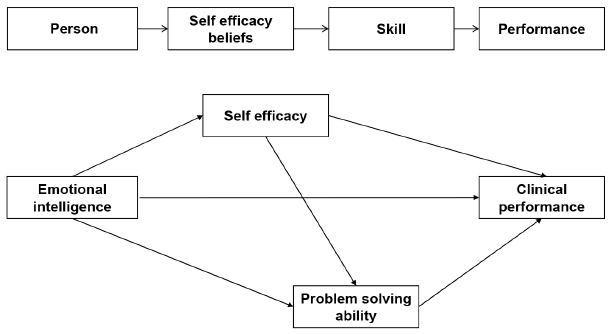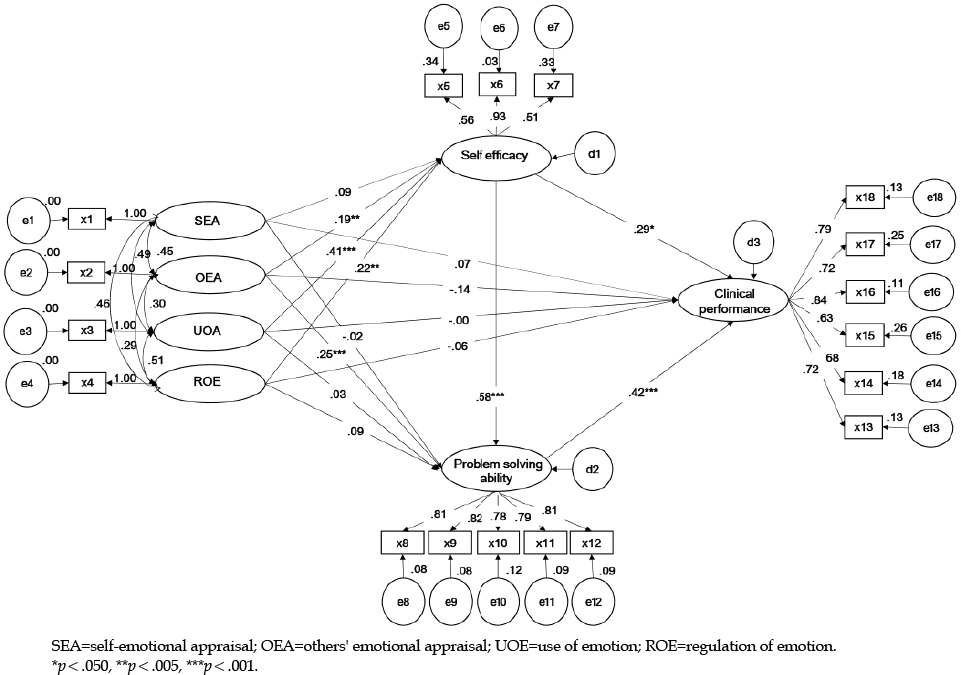Korean J Adult Nurs.
2019 Aug;31(4):380-388. 10.7475/kjan.2019.31.4.380.
Emotional Intelligence, Problem Solving Ability, Self Efficacy, and Clinical Performance among Nursing Students: A Structural Equation Model
- Affiliations
-
- 1Assistant Professor, Department of Nursing, Kaya University, Gimhae, Korea.
- 2Professor, Department of Nursing, Kosin University, Busan, Korea. sue@kosin.ac.kr
- KMID: 2455720
- DOI: http://doi.org/10.7475/kjan.2019.31.4.380
Abstract
- PURPOSE
This study aimed to construct and test the structural relationships between self efficacy and clinical performance among undergraduate nursing students. The model was based on Bandura's self efficacy theory and a review of previous studies. The hypothesized model included emotional intelligence as a personal factor, self efficacy as self efficacy beliefs, problem solving ability as a skill, and clinical performance as a performance.
METHODS
Data were collected from June 23 to August 11, 2014 using structured questionnaires. The study sample was 205 senior nursing students. Data were analyzed using SPSS/WIN 21.0 and AMOS 21.0 programs.
RESULTS
The hypothesized model was shown to be χ2=183.186 (dF=118), Goodness-of- Fit Index (GFI)=.91, Normed Fit Index (NFI)=.91, Comparative Fit Index (CFI)=.96, and Root Mean Squared Error of Approximation (RMSEA)=.05. Self efficacy (β=.29 p=.033) and problem solving ability (β=.42 p=.007) had a direct effect on the clinical performance. Furthermore, self efficacy had mediating effect on the relationship between emotional intelligence and clinical performance.
CONCLUSION
These findings provide that when developing nursing curriculum and intervention programs, self efficacy and problem solving ability should be considered as key factors facilitating the clinical performance of nursing students. Moreover, consideration should be given to the indirect effects of emotional intelligence subscales on clinical performance via self efficacy and problem solving ability.
MeSH Terms
Figure
Reference
-
1. Kahya E, Oral N. Measurement of clinical nurse performance: developing a tool including contextual items. Journal of Nursing Education and Practice. 2018; 8(6):112–123.
Article2. Park JW, Kim CJ, Kim YS, Yoo MS, Yoo HR, Chae SM, et al. Impact of critical thinking disposition, general self-efficacy, and leadership on clinical competence in nursing students. Korean Journal Medical Education. 2012; 24(3):223–231.
Article3. Nabolsi M, Zumot A, Wardam L, Abu-Moghli F. The experience of Jordanian nursing students in their clinical practice. Procedia - Social and Behavioral Sciences. 2012; 46:5849–5857. DOI: 10.1016/j.sbspro.2012.06.527.
Article4. Hickey MT. Preceptor perceptions of new graduate nurse readiness for practice. Journal for Nurses in Staff Development. 2009; 25(1):35–41. DOI: 10.1097/NND.0b013e318194b5bb.
Article5. Baraz S, Memarian R, Vanaki Z. Learning challenges of nursing students in clinical environments: a qualitative study in Iran. Journal of Education and Health Promotion. 2015; 4(52):DOI: 10.4103/2277-9531.162345.6. Hartigan-Rogers JA, Cobbett SL, Amirault MA, Muise-Davis ME. Nursing graduates' perceptions of their undergraduate clinical placement. International Journal of Nursing Education Scholarship. 2007; 4(1):DOI: 10.2202/1548-923X.1276.
Article7. Bakr MM, Safaan SM. Emotional intelligence: a key for nurses' performance. The Journal of American Science. 2012; 8(11):385–393. DOI: 10.7537/marsjas081112.59.8. Codier E, Codier D. Do emergency nurses have enough emotional intelligence? Emergency Nurse. 2015; 23(3):26–29. DOI: 10.7748/en.23.3.26.e1388.
Article9. Codier E, Codier D. A model for the role of emotional intelligence in patient safety. Asia-Pacific Journal of Oncology Nursing. 2015; 2(2):112–117.
Article10. Kim MS. The mediating effect of self-efficacy in the relationship between emotional intelligence and clinical performance among nursing students. The Journal of Korean Academic Society of Nursing Education. 2016; 22(4):504–513. DOI: 10.5977/jkasne.2016.22.4.504.
Article11. Yang SY. The effect of emotional intelligence and self-efficacy on clinical competence of the nursing students. The Journal of the Korea Contents Association. 2015; 15(6):370–378. DOI: 10.5392/JKCA.2015.15.06.370.
Article12. Andonian L. Emotional intelligence, self-efficacy, and occupational therapy students' fieldwork performance. Occupational Therapy In Health Care. 2013; 27(3):201–215.
Article13. Beauvais AM, Brady N, O'Shea ER, Griffin MTQ. Emotional intelligence and nursing performance among nursing students. Nurse Education Today. 2011; 31(4):396–401.
Article14. Chaung SK. Critical thinking disposition, problem solving ability, and clinical competence in nursing students. Journal of Korean Academy of Fundamentals of Nursing. 2011; 18(1):71–78.15. Altun I. The perceived problem solving ability and values of student nurses and midwives. Nurse Education Today. 2003; 23(8):575–584. DOI: 10.1016/S0260-6917(03)00096-0.
Article16. Kim KS, Choi JH. The relationship between problem solving ability, professional self concept, and critical thinking disposition of nursing students. International Journal of Bio-Technology. 2014; 6(5):131–142. DOI: 10.14257/ijbsbt.2014.6.5.13.
Article17. Lee EJ, Yi YJ, Kim YS, Jo HS, Kim HS, KIM YM, et al. Comparison of factors affecting clinical competence between associate and bachelor nursing students completed nursing courses. The Journal of Korean Academic Society of Nursing Education. 2011; 17(2):218–225. DOI: 10.5977/JKASNE.2011.17.2.218.
Article18. Bandura A. Self-efficacy: toward a unifying theory of behavioral change. Psychological Review. 1977; 84(2):191–215. DOI: 10.1037/0033-295X.84.2.191.
Article19. Park M. Gender difference in mediating effects of self-efficacy for the prevention of sexually transmitted disease (STD) among college students' STD knowledge, susceptibility, and sexual autonomy. Korean Journal of Adult Nursing. 2016; 28(4):482–490. DOI: 10.7475/kjan.2016.28.4.482.20. Kim HJ, Lee MK. The relationship between illness perception and health behaviors among patients with tuberculosis: mediating effects of self-efficacy and family support. Korean Journal of Adult Nursing. 2017; 29(6):626–636. DOI: 10.7475/kjan.2017.29.6.626.
Article21. Bandura A. YS Park YC Kim . Self-efficacy: the exercise of control. Seoul: Kyoyook-kwahak-sa Co;2001.22. Maddux JE, Snyder CR, Lopez SJ, editors. Self-efficacy: the power of believing you can. NY: Oxford University Press;2000.23. Zimmerman BJ. Self-efficacy: an essential motive to learn. Contemporary Educational Psychology. 2000; 25(1):82–91. DOI: 10.1006/ceps.1999.1016.
Article24. Por J, Barriball L, Fitzpatrick J, Roberts J. Emotional intelligence: its relationship to stress, coping, well-being and professional performance in nursing students. Nurse Education Today. 2011; 31(8):855–886. DOI: 10.1016/j.nedt.2010.12.023.
Article25. Zengin N, Pinar R, Akinci AC, Yildiz H. Psychometric properties of the self-efficacy for clinical evaluation scale in Turkish nursing students. Journal of Clinical Nursing. 2013; 23(7-8):976–984. DOI: 10.1111/jocn.12257.
Article26. Rice E. Predictors of successful clinical performance in associate degree nursing students. Nurse Educator. 2015; 40(4):207–211. DOI: 10.1097/NNE.0000000000000136.
Article27. Park HS, Han JY. Factors influencing clinical competence in nursing students. Journal of Korean Academy of Fundamentals of Nursing. 2013; 20(4):438–448.
Article28. Wong CS, Law KS. The effects of leader and follower emotional intelligence on performance and attitude: an exploratory study. The Leadership Quarterly. 2002; 13(3):243–274. DOI: 10.1016/S1048-9843(02)00099-1.
Article29. Jung HY. An empirical study on the effect of emotional intelligence on organizational effectiveness [dissertation]. Busan: Pusan National University;2007.30. Lee WS, Park SH, Choi EY. Development of a Korean problem solving process inventory for adults. Journal of Korean Academy of Fundamentals of Nursing. 2008; 15(4):548–557.31. Cha JE. A study for the general self-efficacy scale development [master's thesis]. Seoul: Ewha Womans University;1997.
Article32. Kim A. A study on the academic failure-tolerance and its correlates. The Korean Journal of Educational Psychology. 1997; 11(2):1–19.33. Lee WH, Kim C, Yoo JS, Hur HK, Kim KS, Lim SM. Development of a clinical competency measurement tool for student. Yonsei Nursing. 1990; 13:17–45.34. Yang JJ, Park MY. The relationship of clinical competency and self-directed learning in nursing students. The Journal of Korean Academic Society of Nursing Education. 2004; 10(2):271–277.35. Kim KS. AMOS Structural equation model analysis. Seoul: Hannare Publishing Co;2010. p. 184–454.36. Woo JP. Structural equation modeling concept. Seoul: Hannare Publishing Co;2012. p. 328–391.37. Fillion L, Fortier M, Goupil RL. Educational needs of palliative care nurses in Quebec. Journal of Palliative Care. 2005; 21(1):12–18.
Article38. Kuiper RA, Murdock N, Grant N. Thinking strategies of baccalaureate nursing students prompted by self-regulated learning strategies. Journal of Nursing Education. 2010; 49(8):429–436. DOI: 10.3928/01484834-20100430-01.
Article39. Karabacak Ü, Sebest S, Öntürk ZK, Aslan FE, Olgun N. Relationship between student nurses' self-efficacy and psychomotor skills competence. International Journal of Nursing Practice. 2013; 19(2):124–130. DOI: 10.1111/ijn.12051.
Article40. Gharetepeh A, Safari Y, Pashaei T, Razaei M, Baqher Kajbaf M. Emotional intelligence as a predictor of self-efficacy among students with different levels of academic achievement at Kermanshah University of Medical Sciences. Journal of Advances in Medical Education and Professionalism. 2015; 3(2):50–55.41. Sim MJ, Oh HS. Influence of self efficacy, learning motivation, and self-directed learning on problem-solving ability in nursing students. The Journal of the Korea Contents Association. 2012; 12(6):328–337.
Article42. Libbrecht N, Lievens F, Carette B, Côté S. Emotional intelligence predicts success in medical school. Emotion. 2014; 14(1):64–73. DOI: 10.1037/a0034392.
Article43. Deniz S. The relationship between emotional intelligence and problem solving skills in prospective teachers. Educational Research and Reviews. 2013; 8(24):2339–2345.
- Full Text Links
- Actions
-
Cited
- CITED
-
- Close
- Share
- Similar articles
-
- The Mediating Effect of Self-Efficacy in the Relationship between Emotional Intelligence and Clinical Performance among Nursing Students
- The effects of a maternal nursing competency reinforcement program on nursing students’ problem-solving ability, emotional intelligence, self-directed learning ability, and maternal nursing performance in Korea: a randomized controlled trial
- The Effects of Learning Styles and Nursing Professional Attitude on Problem-Solving Ability among Nursing Students
- Effects of Task Performance Style in Nursing Management Practicum on Problem-Solving and Nursing Competency according to Communication Ability of Nursing Students
- Critical Thinking Disposition, Problem Solving Ability, and Clinical Competence in Nursing Students



